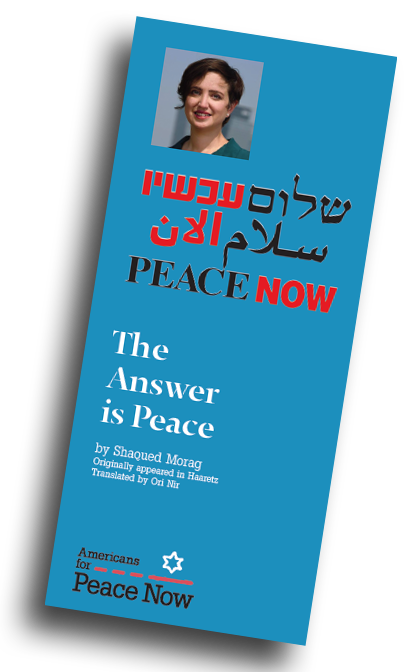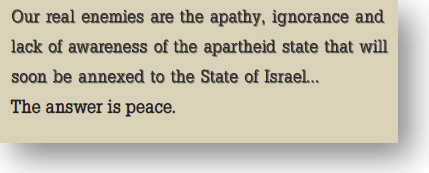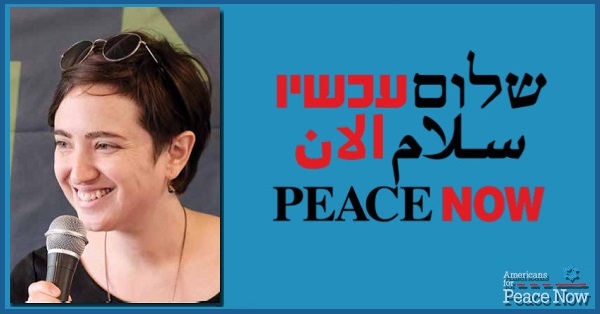
This piece by Shaqued Morag, Executive Director of Peace Now, first appeared as a Ha'aretz article and APN has turned into a brochure.
I grew up in an era when peace was not a fantasy but an option. When I was nine, the first Oslo agreement was signed with the Palestinians. That year, the song that won Israel’s Festigal, the children’s song festival, was titled “Peace is a Useful Word.” A year later, Yitzhak Rabin signed the peace agreement with Jordan. It was clear that this was what prime ministers were supposed to do. When I was 11, the Oslo II agreement was signed. Shortly thereafter, Rabin was assassinated. At my school in Kfar Malal, they continued to educate for peace. We came every year to Rabin Square for the memorial, welcomed the withdrawal from Lebanon and later from the Gaza Strip, and continued to believe in peace. Because there is no other way.
But what was known to every child in the 1990s, that occupation is temporary, and that peace should be sought, has become much less clear over the years. While “Candlelight Youth” of 1994 grew up to be a high-tech generation, the settlers’ Hilltop Youth settled in Israeli positions of power to make the temporary as permanent as possible. Illegal outposts began to pop up deep in the West Bank, in areas that were not supposed to be part of Israel after the peace agreement. Today, their number exceeds 100. What is being sold to us as a “political deadlock” is actually a very dynamic situation, where facts are set on the ground by a minority that does not wait for Israeli citizens’ approval.
Recent polls show that most in the Israeli public, left and right, prefer peace and security over more territory and the dream of Greater Israel, but do not trust the Palestinian partner. This is not surprising given that most young people today have never met a Palestinian unless they served as soldiers in the Occupied Territories. Most of us do not go beyond the Green Line and are unaware of the reality there. But normalizing what goes on there is permeating all aspects of our lives. It undermines some of our basic values, such as equality, non-violence and freedom of expression.
Since the last elections, the settlers’ representatives seem to believe that time is ripe to advance their vision of apartheid to the forefront of our public debate. Those who refuse to pay a price in land demand that we pay the price in democracy. Annexing the territories without giving equal rights to their residents is the alternative to peace that the extreme right is offering. I still believe this is a price that Israeli society refuses to pay, but I fear that the next government will pay it on our behalf.
 Our real enemies are the apathy, ignorance and lack of awareness
of the apartheid state that will soon be annexed to the State of Israel. Every citizen who cares
about Israeli democracy should consider what goes on beyond the Green Line. The conclusion is inevitable: a
state is needed for the Palestinian people alongside the State of Israel. Two states for the two peoples. The
agreement can be signed in the coming years. And I hope that true peace will pursue.
Our real enemies are the apathy, ignorance and lack of awareness
of the apartheid state that will soon be annexed to the State of Israel. Every citizen who cares
about Israeli democracy should consider what goes on beyond the Green Line. The conclusion is inevitable: a
state is needed for the Palestinian people alongside the State of Israel. Two states for the two peoples. The
agreement can be signed in the coming years. And I hope that true peace will pursue.
When my grandparents were young, they did not ask themselves whether during their lifetime the Jews would have a state in the Land of Israel. They fought to make it happen. The question we need to ask ourselves today is how in our lifetime we will not lose the state that they worked so hard to establish.
The answer is peace.
Shaqued Morag is the Executive Director of Peace Now since July 2018. A seasoned activist in Jerusalem, she came to Peace Now after having served in senior positions in the Meretz party, including as the party’s acting secretary-general, and as a longtime parliamentary adviser to MK Michal Rozin. She served as the community coordinator in Jerusalem for Mahapach-Taghir, a grassroots Israeli Jewish-Palestinian organization for social change, where she is now a member of the Executive Committee. Shaqued holds a B.A. in philosophy and cognitive sciences at the Hebrew University and is currently completing her master’s thesis there in public policy.
